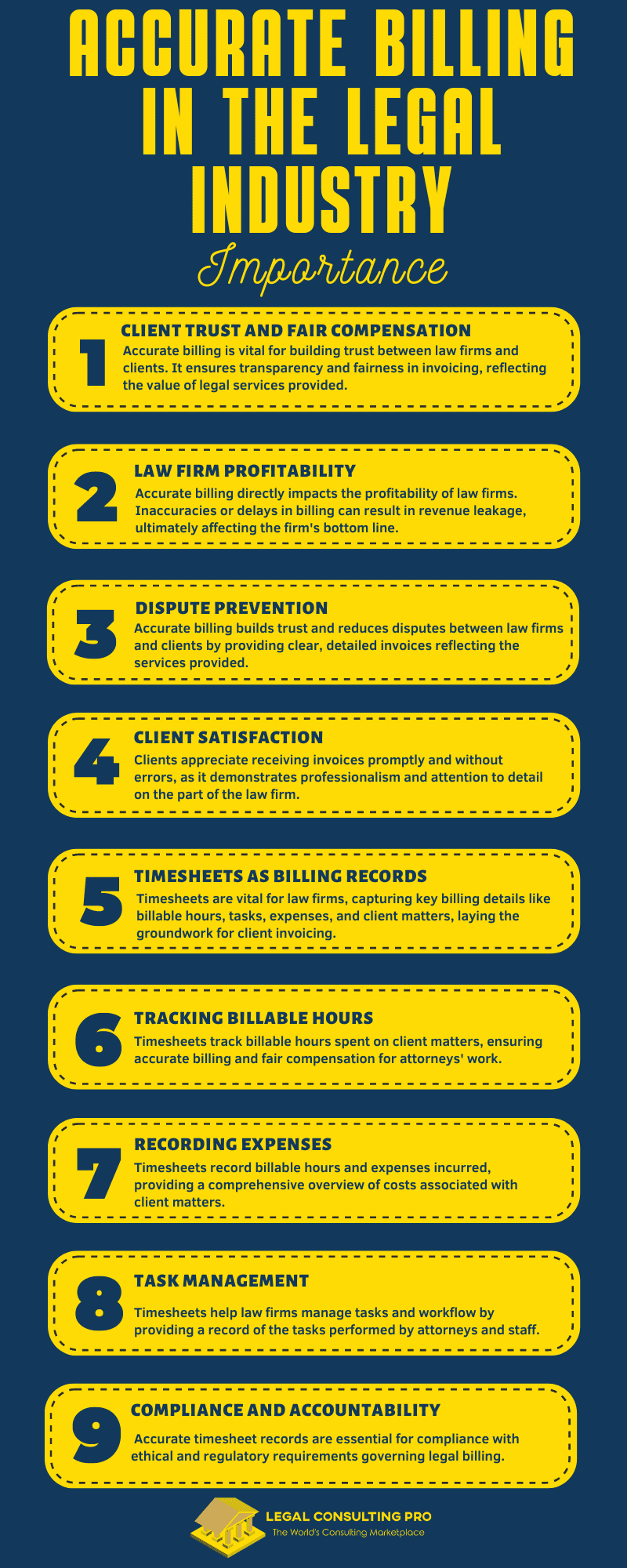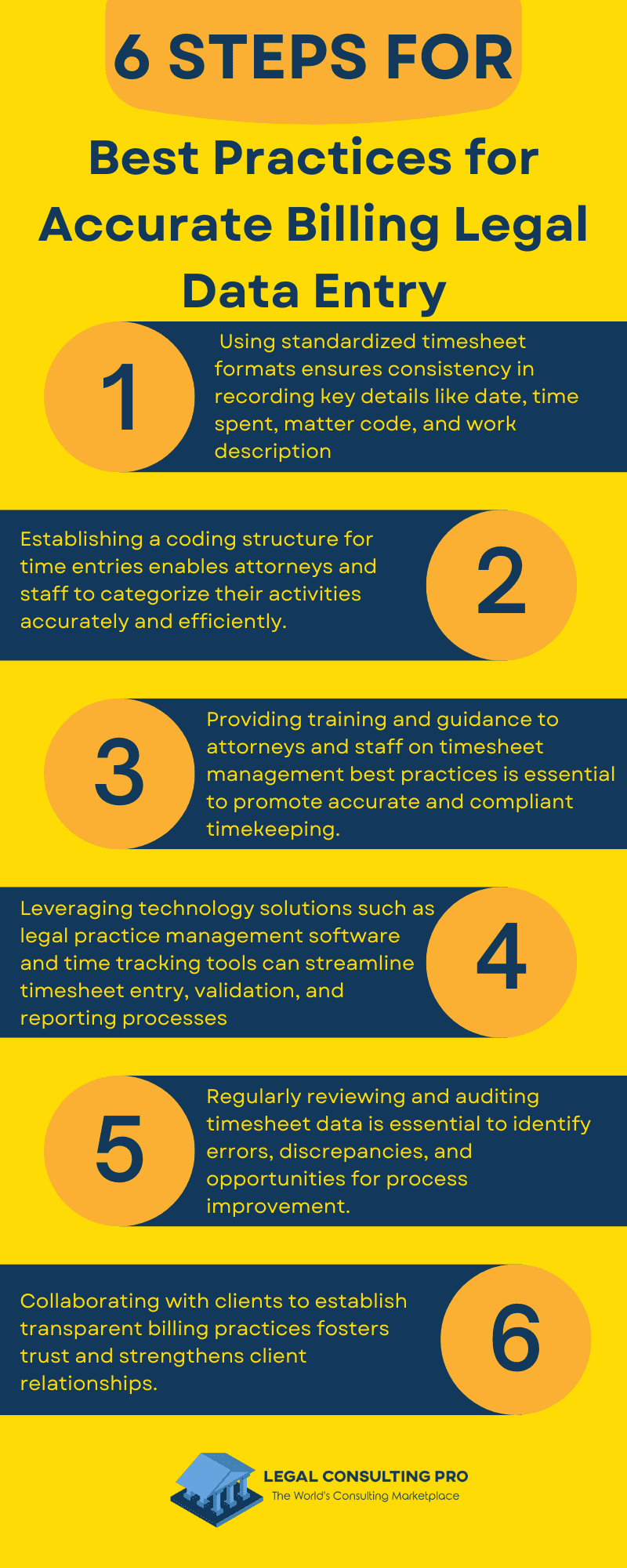Introduction
In the legal industry, precise billing practices are imperative not only for invoicing clients accurately but also for managing finances effectively, ensuring client contentment, and enhancing the firm’s profitability. Timesheets serve as the bedrock of billing procedures, offering a comprehensive account of billable hours, incurred expenses, and completed tasks. However, navigating the intricacies of capturing, organizing, and analyzing timesheet data can prove challenging and prone to errors if not equipped with the appropriate systems and protocols. This article delves into the pivotal role played by legal data entry and litigation support services in the transformation of timesheet data into actionable insights, thereby streamlining and optimizing the legal billing processes.
The Importance of Accurate Billing in the Legal Industry
Accurate billing is paramount in the legal industry, serving as the bedrock of financial management, client satisfaction, and law firm profitability. In a sector where time is money, precise tracking and invoicing of billable hours, expenses, and tasks are essential for ensuring fair compensation and maintaining trust with clients.
- Client Trust and Fair Compensation: Accurate billing is crucial for fostering and maintaining trust between law firms and their clients. Clients expect transparency and fairness in the billing process, and accurate invoicing ensures that clients are billed appropriately for the legal services they receive.
- Law Firm Profitability: Accurate billing directly impacts the profitability of law firms. Inaccuracies or delays in billing can result in revenue leakage, ultimately affecting the firm’s bottom line. By ensuring that all billable hours and expenses are accurately recorded and invoiced, law firms can maximize their profitability.
- Dispute Prevention: Accurate and transparent billing practices help prevent disputes between law firms and their clients. When clients receive clear and detailed invoices that accurately reflect the services provided, they are less likely to question or dispute the charges.
- Client Satisfaction: Timely and accurate billing contributes to overall client satisfaction. Clients appreciate receiving invoices promptly and without errors, as it demonstrates professionalism and attention to detail on the part of the law firm.
- Timesheets as Billing Records: Timesheets serve as the primary source of billing information for law firms. They capture important details such as billable hours, tasks performed, expenses incurred, and client matter information. Timesheets provide a comprehensive record of the work performed by attorneys and staff, forming the basis for client invoicing.
- Tracking Billable Hours: Timesheets allow law firms to track billable hours spent on various client matters. This information is essential for accurately billing clients for the time spent on legal services and ensuring that attorneys are appropriately compensated for their work.
- Recording Expenses: In addition to billable hours, timesheets also capture expenses incurred during providing legal services. These expenses may include travel costs, court fees, document production expenses, and other disbursements related to client matters.
- Task Management: Timesheets help law firms manage tasks and workflow by providing a record of the tasks performed by attorneys and staff. This information can be used to allocate resources effectively, prioritize tasks, and track progress on client matters.
- Compliance and Accountability: Accurate timesheet records are essential for compliance with ethical and regulatory requirements governing legal billing. They provide a detailed audit trail of the work performed by attorneys, ensuring accountability and transparency in the billing process.

Challenges in Timesheet Management
Efficient and accurate timesheet management is crucial for law firms to ensure transparent billing practices, maximize revenue, and maintain client satisfaction. However, navigating the complexities of timesheet management poses numerous challenges for legal professionals. From manual data entry processes to inconsistencies in time tracking, law firms encounter various obstacles that can impact their billing accuracy and efficiency.
- Manual and labor-intensive processes: Timesheet management in the legal industry often relies on manual input and paper-based systems, which are prone to errors and inefficiencies. Attorneys and staff members manually record their time and expenses, leading to inconsistencies and inaccuracies in billing records.
- Missing or incomplete timesheets: One of the primary challenges in timesheet management is the occurrence of missing or incomplete timesheets. Attorneys and staff may forget to record their time or fail to provide detailed descriptions of the tasks performed, resulting in gaps in billing records and potential loss of revenue for the firm.
- Inaccurate time entries: Inaccuracies in time entries are another common issue in timesheet management. Human error, such as miscalculations or misinterpretations of time spent on tasks, can lead to discrepancies in billing records. These inaccuracies can result in overbilling or underbilling clients, damaging client relationships and eroding trust.
- Difficulty tracking billable hours: Law firms often work on multiple matters for various clients simultaneously, making it challenging to track billable hours across different projects and clients. Without a centralized system for timesheet management, attorneys and staff may struggle to allocate their time effectively and accurately bill clients for the work performed.
- Revenue leakage and missed billing opportunities: Inadequate systems and processes for timesheet management can result in revenue leakage and missed billing opportunities for law firms. Unrecorded billable hours, overlooked expenses, and inaccurately billed time can add up over time, leading to significant revenue losses and reduced profitability for the firm.
The Role of Legal Data Entry in Timesheet Management
Legal data entry specialists are instrumental in maintaining the integrity and accuracy of timesheet data within law firms. Their role encompasses various tasks aimed at ensuring that timesheet entries are recorded meticulously and following the firm’s billing policies and client agreements.
First and foremost, legal data entry specialists focus on accurately transcribing timesheet entries from various sources, including physical timesheets, digital records, and time-tracking software. This transcription process requires careful attention to detail to avoid errors or omissions that could lead to inaccuracies in billing.
Once transcribed, these specialists meticulously organize the timesheet data, ensuring that entries are categorized correctly based on factors such as client matter, task performed, and billable hours. This organization is essential for maintaining a structured and easily accessible repository of timesheet information, facilitating efficient billing and reporting processes.
Moreover, legal data entry specialists play a vital role in aligning timesheet entries with client billing guidelines and fee arrangements. This involves interpreting complex billing requirements, such as billing increments, rate structures, and expense policies, and applying them consistently to timesheet entries. By adhering to these guidelines, legal data entry specialists help ensure that clients are billed accurately and transparently, minimizing the risk of billing disputes or discrepancies.
To streamline the timesheet entry process and enhance data accuracy, legal data entry services leverage advanced tools and techniques. These may include automated data entry software, optical character recognition (OCR) technology, and specialized time-tracking systems. By harnessing technology, legal data entry specialists can expedite the timesheet entry process, reduce manual errors, and improve overall efficiency in managing timesheet data.
In summary, legal data entry specialists play a crucial role in the accurate transcription, organization, and management of timesheet data within law firms. By ensuring consistency, accuracy, and compliance with billing guidelines, these specialists contribute to the smooth functioning of billing processes, client satisfaction, and firm profitability.
Leveraging Litigation Support Services for Timesheet Analysis
Litigation support services offer invaluable support in analyzing timesheet data to uncover valuable insights and enhance billing processes within law firms.
- Identifying Trends and Patterns: Litigation support services specialists leverage their expertise to analyze timesheet data and identify trends or patterns that may be indicative of areas for improvement. By examining factors such as billable hours, matter types, and attorney productivity over time, they can pinpoint inefficiencies or bottlenecks in the billing process.
- Enhancing Attorney Productivity: Through detailed analysis of timesheet data, litigation support services help law firms evaluate attorney productivity and efficiency. By comparing billable hours across different attorneys, matters, or practice areas, they can identify high-performing individuals or areas for additional training or support.
- Optimizing Matter Profitability: Litigation support services specialists assist in evaluating matter profitability by analyzing timesheet data in conjunction with financial metrics such as billing rates, costs, and revenues. This analysis allows law firms to assess the profitability of individual matters or client portfolios and make informed decisions about resource allocation and pricing strategies.
- Understanding Client Billing Preferences: By examining timesheet data about client billing preferences and agreements, litigation support services help law firms gain insights into client expectations and requirements. This understanding enables firms to tailor their billing practices to align with client preferences, fostering stronger client relationships and satisfaction.
- Resource Allocation and Planning: Litigation support services specialists use data analytics tools and methodologies to assist law firms in optimizing resource allocation and planning. By analyzing timesheet data alongside other relevant metrics such as workload distribution and case complexity, they help firms allocate resources effectively, minimize underutilization, and maximize profitability.
Best Practices for Accurate Billing Legal Data Entry
Implementing standardized timesheet templates and coding structures is essential to ensure consistency and accuracy in time entries across the law firm.
- Standardized Templates: By implementing standardized timesheet templates, law firms can ensure that all time entries follow a consistent format and capture essential details such as date, time spent, matter code, and description of work performed. This standardization minimizes errors and discrepancies in time tracking and facilitates easier analysis and reporting of timesheet data.
- Coding Structures: Establishing a coding structure for time entries enables attorneys and staff to categorize their activities accurately and efficiently. This structure may include codes for different practice areas, tasks, or clients, allowing for better tracking of billable hours and expenses. Consistent use of coding structures ensures that time entries are categorized correctly and aligned with client billing guidelines.
- Training and Guidance: Providing training and guidance to attorneys and staff on timesheet management best practices is essential to promote accurate and compliant timekeeping. Training sessions can cover topics such as proper timekeeping techniques, adherence to billing guidelines, and the importance of detailed time descriptions. By educating personnel on the significance of accurate timekeeping, law firms can improve overall data quality and billing accuracy.
- Technology Solutions: Leveraging technology solutions such as legal practice management software and time tracking tools can streamline timesheet entry, validation, and reporting processes. These tools automate repetitive tasks, such as time entry and validation, reducing the likelihood of errors and speeding up the billing process. Additionally, they provide real-time visibility into billable hours and expenses, enabling attorneys and staff to track their time more efficiently.
- Regular Review and Audit: Regularly reviewing and auditing timesheet data is essential to identify errors, discrepancies, and opportunities for process improvement. Law firms should establish procedures for reviewing timesheets regularly, such as weekly or monthly audits, to ensure data accuracy and compliance with billing guidelines. Any discrepancies or issues identified during the review process should be promptly addressed and corrected to maintain data integrity.
- Collaboration with Clients: Collaborating with clients to establish transparent billing practices fosters trust and strengthens client relationships. Law firms should work closely with clients to define clear fee arrangements, billing cycles, and invoicing procedures upfront. By proactively communicating billing expectations and addressing any concerns or questions, law firms can minimize disputes and ensure timely payment for services rendered.

Case Studies: Real-World Examples of Success
Highlighting case studies or success stories can provide valuable insights into the benefits of implementing legal data entry and litigation support services in improving billing accuracy, efficiency, and client satisfaction.
- Case Study 1: Improved Billing Accuracy: Law Firm A implemented a legal data entry system to streamline timesheet management and improve billing accuracy. By adopting standardized timesheet templates and coding structures, the firm reduced errors and discrepancies in time entries. As a result, billing accuracy improved, leading to fewer billing disputes and higher client satisfaction scores.
- Case Study 2: Enhanced Efficiency: Law Firm B partnered with a litigation support services provider to automate timesheet entry and validation processes using advanced technology solutions. By leveraging time-tracking tools and legal practice management software, the firm reduced manual data entry efforts and minimized the time spent on administrative tasks. This increased efficiency allowed attorneys and staff to focus more on billable work, leading to higher productivity and profitability.
- Case Study 3: Optimized Resource Allocation: Law Firm C utilized data analytics and insights derived from timesheet data to optimize resource allocation and staffing decisions. By analyzing attorney productivity, matter profitability, and utilization rates, the firm identified opportunities to reallocate resources to high-value matters and improve overall profitability. This strategic approach to resource management helped the firm achieve better outcomes for clients while maximizing billable hours and revenue.
- Case Study 4: Improved Billing Realization Rates: Law Firm D implemented a comprehensive billing management system that integrated legal data entry with billing processes. By accurately capturing and analyzing timesheet data, the firm identified billing trends and patterns that helped improve billing realization rates. By addressing billing inefficiencies and optimizing billing practices, the firm was able to increase revenue and profitability while maintaining client satisfaction.
These case studies demonstrate the significant impact that legal data entry and litigation support services can have on improving billing accuracy, efficiency, and client satisfaction in the legal industry. By leveraging technology, best practices, and data analytics, law firms can enhance their billing processes and achieve better outcomes for both clients and the firm.
Conclusion
Accurate billing is a cornerstone of financial stability and client trust within law firms. In an industry where time is money, ensuring precise invoicing not only fosters transparency and credibility but also safeguards the firm’s financial health. Legal data entry and litigation support services emerge as invaluable assets in this pursuit, acting as catalysts for transforming raw timesheet data into actionable insights that drive efficiency and profitability.
In the complex landscape of legal billing, legal data entry and litigation support services serve as guiding lights, navigating firms through the intricacies of timesheet management and billing processes. These services meticulously transcribe, organize, and analyze timesheet data, ensuring that every billable hour, expense, and task is accurately recorded and accounted for. By employing advanced tools and techniques, they streamline timesheet entry, minimize errors, and enhance data accuracy, laying the foundation for reliable billing practices.
However, the significance of legal data entry and litigation support services extends beyond mere data transcription. These services delve deeper into timesheet analysis, leveraging data analytics and insights to optimize billing processes and resource allocation. By identifying trends, patterns, and opportunities for improvement within timesheet data, they empower law firms to make informed decisions that enhance billing accuracy, maximize billable hours, and improve overall profitability.
Similar blogs:
Legal Data Entry: Unmasking Opinions: Transforming Survey Responses into Insights
The Top Features and Must-Knows for Selecting Your Legal Billing Software!







































